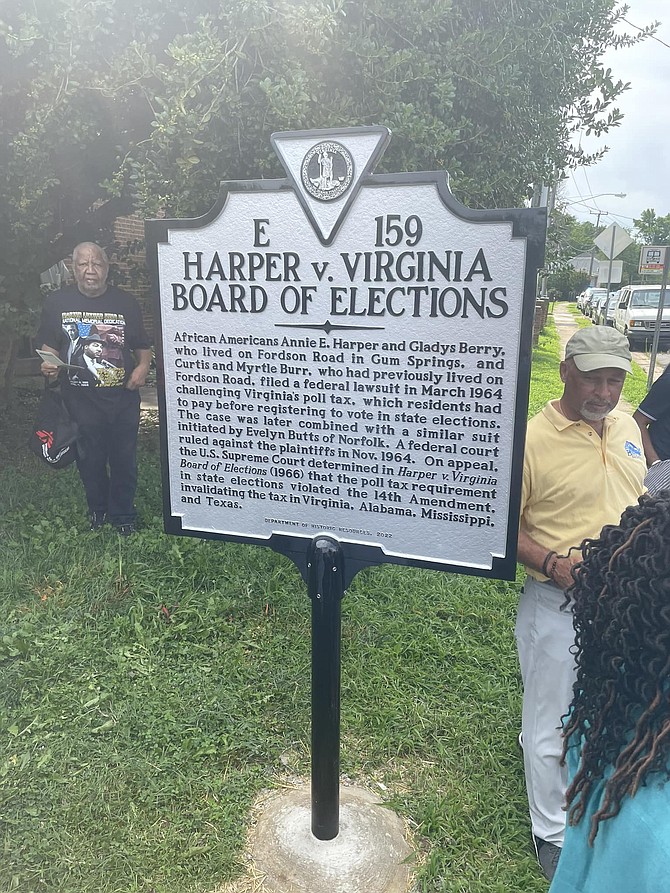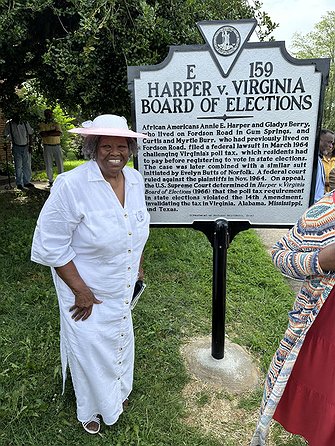Last Saturday morning, the public witnessed a rare and wonderful event taking place on Fordson Road, the unveiling of the Annie E. Harper Virginia historical highway marker in Gum Springs. It was followed by a reception at Bethlehem Baptist Church, with special exhibits, and a community celebration. The event was the culmination of a lot of hard work by a number of community members including the leadership of the indefatigable Queenie Cox, who acted as the MC, and was joined on the planning committee by Brenda Faison, who spearheaded the project, with Martha Coleman, David Carter, Carla Dobson, Ada Johnson, Brenda Page-Murphy, Cassandra McClerkin, Gerald Peteet, Connie Royal and John Spears. It’s important to recognize everyone involved because of the significance and difficulty of bringing it to fruition. It would be an injustice to not thank them publicly for their dedication and hard work.
The invocation was led by the Rev. Dr. Darrell K. White, Pastor of Bethlehem Baptist Church and Minister Marcus McCallum-Ferguson provided the scripture, followed by a number of special guest speakers. Those included Dr. Colita Nichols Fairfax representing the Virginia Department of Historical Resources which is responsible for the historical marker program. She is a social justice professor at Norfolk State University and gave a terrific speech on why this marker is so important. Deacon-In-Training Clifton S. Johnson Sr., a member of Bethlehem Baptist Church, then provided a very moving real-life experience related to voting under the poll tax. Finally, some elected officials including me spoke on the importance of the marker and the recognition of Deaconess Harper, who was a member of Bethlehem Baptist Church too.
Though this historical event was some sixty years ago, we were joined by Annie E. Harper’s daughter-in-law, Rev. Evelyn Harper, and granddaughters Eldalene and Malanie Harper too. It was in March 1964, that Allison W. Brown Jr., an attorney and executive board member for the ACLU and the NAACP in Washington, D.C. filed a suit on behalf of four Fairfax County residents, two of whom lived in Gum Springs, Annie E. Harper and Gladys Berry, and in Springbank, Curtis and Myrtle L. Burr. They courageously agreed to join the fight against the poll tax which was included in the Virginia Constitution in 1904 to suppress the Black vote. It was blatant discrimination and members of the General Assembly were not shy about that. The new Virginia Constitution instituted an annual poll tax that excluded over 85% of Black voters! Annie E. Harper’s poll tax was $4.71, equal to $41.69 today, and she had to pay it each year or 5% interest was added too.
Annie E. Harper, age 79, was a retired domestic worker living on social security. Gladys A. Berry, age 42, was an unemployed domestic worker. Curtis and Myrtle Burr were the parents of nine children. Curtis, then a 41-year-old veteran of World War II, supported his family on less than $3,000 annually as a brick mason.
In 1964, the Twenty-fourth Amendment to the Constitution was ratified prohibiting poll taxes in all Federal elections. The Civil Rights Act of 1964 was adopted prohibiting discrimination on the basis of race, color, religion, sex, or national origin. And, in August 1965, the Voting Rights Act was adopted prohibiting states and localities from imposing voting qualifications or prerequisites to voting, or standards, practices, or procedures that deny or curtail the right of a U.S. citizen to vote on the basis of race, color, or language.
By 1964, only four southern states, Alabama, Mississippi, Texas, and Virginia, still implemented a poll tax for state and local elections. These states clung to a 1937 ruling by the U.S. Supreme Court that poll taxes were not racially discriminatory and therefore legal. But, thanks to Harper v. Virginia Board of Elections, in 1966, combined with a similar case initiated by the civil rights activist, Evelyn Butts of Norfolk, in a 6–3 decision, the Supreme Court ruled poll taxes to be unconstitutional. This put an end to more than sixty years of inequality for Black voters in the United States. The current Virginia Constitution, adopted in 1971, expressly prohibits the prerequisite of a poll tax to register to vote in Virginia.
Annie E. Harper died at age 98, in 1983, and is buried locally in Snowden Cemetery. She, and the others, deserve this recognition today and forever. We can thank the many community members of Gum Springs who came together on a warm Saturday morning for making this historical marker possible and reminding us of history being made in this historic Black community.

